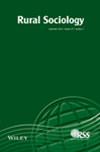Perceptions and Experiences of Gender Transformative Approaches in Rural Honduras*
IF 2.3
3区 社会学
Q2 SOCIOLOGY
引用次数: 0
Abstract
This research examines the potential of gender‐transformative approaches (GTAs) to improve gender equality in agricultural extension programs and food security through experiential learning and participatory methods. Scholars of gender and agriculture have long highlighted the gender gap in access to agricultural resources; to address this issue, development organizations have integrated GTAs into their initiatives. The article presents an empirical case study of a gender transformative‐farmer field school (GTA‐FFS) in rural Honduras and examines participants' perceptions of the short‐ and long‐term benefits and limitations of these programs. The findings indicate that GTA‐FFSs can provide participants with valuable knowledge and skills in agriculture, but structural barriers such as lack of suitable land, access to water, labor, and time hinder their ability to apply the learnings. These barriers are particularly salient for women participants. This research contributes to the literature on GTAs by identifying structural barriers to their short‐ and long‐term success. It also offers insights for development practitioners and policymakers engaged in advancing gender equality and food security in rural contexts; in particular, strengthening the rural social safety net.洪都拉斯农村地区对性别变革方法的看法和经验*
本研究探讨了性别变革方法(GTAs)在通过体验式学习和参与式方法改善农业推广计划中的性别平等和粮食安全方面的潜力。长期以来,研究性别和农业问题的学者们一直强调在获取农业资源方面存在的性别差距;为解决这一问题,发展组织已将性别转变方法纳入其举措中。本文对洪都拉斯农村地区的性别变革-农民田间学校(GTA-FFS)进行了实证案例研究,并考察了参与者对这些项目的短期和长期益处及局限性的看法。研究结果表明,GTA-FFS 可以为参与者提供宝贵的农业知识和技能,但缺乏合适的土地、水源、劳动力和时间等结构性障碍阻碍了他们应用所学知识的能力。这些障碍对女性参与者尤为突出。本研究通过确定阻碍全球培训计划取得短期和长期成功的结构性障碍,为有关全球培训计划的文献做出了贡献。它还为在农村环境中促进性别平等和粮食安全的发展实践者和政策制定者提供了见解,尤其是在加强农村社会安全网方面。
本文章由计算机程序翻译,如有差异,请以英文原文为准。
求助全文
约1分钟内获得全文
求助全文
来源期刊

RURAL SOCIOLOGY
SOCIOLOGY-
CiteScore
4.60
自引率
13.00%
发文量
47
期刊介绍:
A forum for cutting-edge research, Rural Sociology explores sociological and interdisciplinary approaches to emerging social issues and new approaches to recurring social issues affecting rural people and places. The journal is particularly interested in advancing sociological theory and welcomes the use of a wide range of social science methodologies. Manuscripts that use a sociological perspective to address the effects of local and global systems on rural people and places, rural community revitalization, rural demographic changes, rural poverty, natural resource allocations, the environment, food and agricultural systems, and related topics from all regions of the world are welcome. Rural Sociology also accepts papers that significantly advance the measurement of key sociological concepts or provide well-documented critical analysis of one or more theories as these measures and analyses are related to rural sociology.
 求助内容:
求助内容: 应助结果提醒方式:
应助结果提醒方式:


